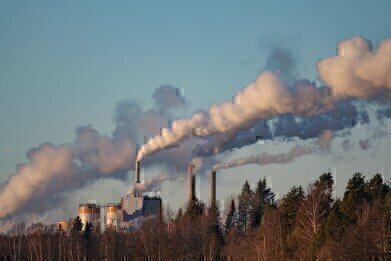Air Clean Up
What’s the Difference Between Natural and Manmade Pollution?
Feb 26 2016
These days, when we hear the buzzword of pollution, we instantly think of huge power plants spouting noxious mushroom-clouds of gases, gridlocked roads chockfull of cars emitting foul fumes from their tail pipes and the inevitable effect this has on our planet. Make no mistake – global warming is a very real concern, especially for those living in lower-lying countries, cities and regions.
However, it would be remiss to assume that all pollution is caused by humans. Indeed, though many people might mistakenly think that all pollution is manmade, they would be sorely mistaken. In fact, pollution has been around since the dawn of time in some form – it’s only since humans have stepped onto the scene that it’s caused such a ruckus.
Human Pollution
We all know that harmful emissions really stepped up their game as a consequence of the Industrial Revolution in the 18th century. What you may not know, however, is that manmade pollution stretches back far farther than that – even as far back as prehistoric times.
How we do know? Well, discovery of a remarkably well-preserved set of teeth in Tel Aviv, Israel last year contained traces of plaque on them. Since we are all so familiar with the word plaque these days from our frequent trips to the dentist, this might not sound significant; but in fact, the plaque points to the idea that the cavemen to whom the teeth belonged used to prepare the meat he had caught by roasting it inside his cave/shelter. As a result, the smoky fumes from the primitive barbecue blackened his teeth and gave us what could be considered the first known case of manmade pollution.
Of course, these days, manmade pollution has escalated rapidly out of control. As well as the air pollution caused by cars and factories mentioned above, we are also contaminating our water supplies with wastewater effluent, run-off, oil spills and other careless methods of waste disposal. We’re ruining our soil with pesticides and fertilisers; we’re sterilising whole towns and cities through nuclear accidents; we’re damaging our own hearing and disrupting animal breeding and foraging patterns with undue noise pollution patterns. To be frank, we’re causing an incredible amount of pollution on a daily basis… and it’s only getting worse.
Natural Pollution
However, pollution has been around for much longer than even that prehistoric cavemen and his dentures. Volcanoes erupt, spitting sulphur dioxide into the atmosphere and sometimes even the stratosphere. Naturally-occurring forest fires can deplete sources of oxygen and emit vast levels of smoke, soot and other harmful gases in the process, thus significantly affecting air quality (of course, forest fires can be started by humans, too). Strong winds can cause erosion and lift up particulate matter, depositing it sometimes thousands of miles away. The decay of organic material leads to the creation of methane, the principal guilty party when it comes to global warming and climate change. Even the defecation, death and decay of animals can compromise water sources.
Obviously, all of these contributions to pollution pale in the face of the human impact on our environment. For one thing, they have been around for millennia and the Earth seems to have survived just fine in that time; for another, they emit miniscule amounts of pollution in comparison to our own sterling efforts.
Therefore, although Mother Nature is not free from blame when it comes to pollution, she can’t hold a candle to (and can’t be blamed for) our own scandalously high effect.
Events
May 05 2024 Seville, Spain
May 13 2024 Munich, Germany
May 23 2024 Beijing, China
May 23 2024 Beijing, China
Jun 10 2024 Algiers, Algeria














